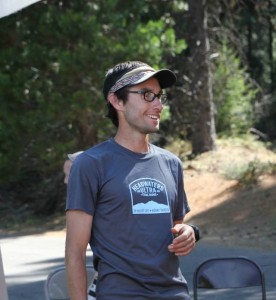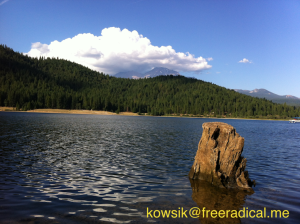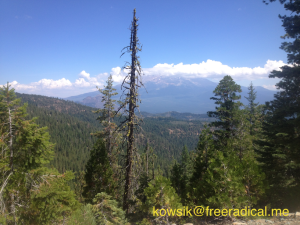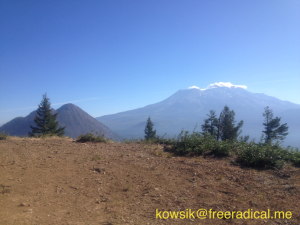I ran the inaugural Headwaters Ultra 50K recently and got to meet Gerad Dean, race director for the ultra. You can check out his race profile on Ultra Signup. As a long term runner (since 2003!), recently turned race director, I was really curious about this transition. I wanted to find out what motivated him to organize a race and some of the things he learned by being on the other side of running. I’m sure it’s a very unique perspective, kinda like the difference between being an employee and starting up your own company. As my 2nd 50K ever, this race kicked my butt, but I was super happy with the aid stations, very clear course markings, amazing volunteers and spectacular vistas of Mt. Shasta. Follow Gerad Dean and Headwaters Ultra on Facebook.
Q&A with Gerad Dean
When did you start running?
It wasn’t until after I graduated college that I began running. The first organized run I entered was the SOB 15k at Mt. Ashland back in 2003. It was a blast and I was happily surprised to finish the race around 70 minutes and in the top 10. About this time I had also developed an interest in the marathon distance. My naiveté of those days told me that 26.2 miles was the ultimate distance one could run in a single effort (after all, didn’t Pheidippides die after covering the distance to deliver the victory message to Athens following the Battle of Marathon?). In October 2003, I entered the Portland Marathon. Having only ran a maximum distance of about 10 miles before the marathon, I had no idea what to expect. I ran hard, had a good run, finished entirely exhausted, but completely enjoyed myself.
Following the race I could barely walk home to my apartment in downtown Portland, but I also had a sense that I could accomplish anything! It was an amazing feeling. For the next couple of years a ran three more marathons, including Boston, and several shorter distance road runs. Everything changed after I ran my first ultra on trails…
What does your day job look like (when you are not running 100 milers)?
I work as a crew leader for a forest inventory data collection team with the US Forest Service. What this means is that I roam around Northern California visiting a network of randomly located research plots collecting various forest measurements. We remeasure the same plots on a 10-year cycle to track trends — you can think of it as a census program for forested lands. Like any successful shopkeeper needs to take inventory of her goods and supplies, a land management agency like the US Forest Service needs to know what is on the landscape to make informed forest management decisions. Our data also plays a part in improving forest science. For example, many wildland fire models and carbon sequestration studies rely on these data sets.
What was your first ultra and what motivated you to run that race?
Curiosity inspired me to run the Jim Bridger 50k outside of Bozeman, MT in 2005. I was living in Missoula, MT at the time, working for a different research project with the Forest Service. I mentioned I started running marathons a few years prior in 2003. Working in the forest and living in a little mountain town, I was now curious to experience ultra marathon trail running. The Jim Bridger 50k is a small, but tough race with 4 passes totaling about 11,000′ elevation gain. Similar to the Portland Marathon, I had no idea what to expect. I would run and exercise fairly regularly, but I certainly wasn’t training for anything. I just figured I’d put my name on the list of registrants and see what happens. It was such a beautiful run! The mountains were ablaze with purple, yellow, pink, and white wildflowers, there were creek crossing you had to stomp through to get across, and the climbs and descents went on forever. I think what really hooked me at that race was how supportive everyone involved was — the runners, the volunteers at each aid station, and the RD himself made a point to congratulate and talk to everyone! I was so happy to be there. This was nothing like the marathons I had been doing, with thousands of other runners all jockeying for position, aid stations littered with paper cups on miles of asphalt, and recovering at the finish line where I didn’t really know anyone. This trail run was entirely different, it felt like a family gathering although I didn’t know anyone there. I knew right away trail running was where I preferred to be.
Congrats on placing 4th in the Waldo 100km recently! How did it feel and how did you train for that?
Thank you, it was definitely one of my most successful runs, perhaps the smartest run of my so called running career. Finishing under 10 hours at Waldo is not something that happens often, and I’m very proud to have the accomplishment. This season has been unique because most of the year I’ve been inundated with balancing my day job, organizing the Headwaters Ultra, and being present with my personal relationships. My training has definitely taken the back seat this season. I went into Waldo with no clear expectations for the finish. My primary goal was to take it easy the first half, and see if I could get some negative splits the second. I wanted to finish strong, and avoid a collapse similar to my experience at Silver State 50M in Reno in May. The plan worked out, and I was able to run the second half about 10 minutes faster than the first, including a nice sub 8-minute mile pace over the last 7 miles to the finish. I learned the value of patience at Waldo this year, and hope to carry that into Pine to Palm 100M on September 14.
What inspired you to put together the Headwaters Ultra 50K?
There were a number of things that influenced my decision to create the Headwaters Ultra trail runs. Over a few years living here I became familiar with the local trails and incredible potential for long distance trail running this area has to offer. Nearly every time I went for a trail run I found myself asking the same question, “Why isn’t there an ultra marathon race here?” After a while I realized that some action had to be taken to bring ultra running to this area. I wanted to create something to share this incredible area with others, to showcase it as the magnificent area that it is.
I wanted to create something to encourage people to get out and be active in nature. And on a personal level, I wanted to have this experience of creating a running event and immerse myself deeper in the culture of ultra running.
What do you feel is special about the Siskiyou trails?
Outside of Mount Shasta City, to the west of town where the Headwaters Ultra 50k is run, we are technically in the greater Klamath Mountain province, and more specifically a subrange of the Klamaths called The Eddys. The Siskiyou Mountains are also a subrange of the Klamath Mountains, but they remain north and west of the Klamath River, extending from Southern Oregon just west of Ashland and trending West-Southwest/East-Northeast to Crescent City. The Klamath Mountains in general are a very special and unique place.
They are home to incredibly diverse and endemically rich floristic landscapes, remote and rugged topography, and some of the oldest and most complex geologic regions of the world. I have lived many places in the west, but I find this region the most fascinating and enjoyable place to be. I have never felt a stronger, more primal bond with a place as I do with these mountains.
How long did it take to organize a race like this?
I began serious conversations about organizing an ultra marathon near Mount Shasta in August 2012. The amount of time and effort it takes to get something like Headwaters Ultra started is amazing to me. With the incredible amount of positive feedback the Headwaters Ultra staff and I received I fully intend to keep it going. I just hope much of the heavy lifting is done and out of the way. I think this upcoming second year will be a good measure for what is needed to keep this event alive year to year.
Being a race director for the first time and looking at the runners from a different perspective, did you learn anything new about running?
It was definitely a different experience being on this side of a race. The most rewarding and encouraging piece of directing my first race was seeing the hard fought pleasure and joy on everyone’s face at the finish, hearing their accounts of how tough and brutal, beautiful and empowering the course is. I love seeing people push themselves to the limit and emerge stronger and overjoyed. This encourages me to keep improving Headwaters Ultra. It’s the details that people notice. I want this race to become one where, as a runner, there are no doubts that everything will be dialed in, you will be supported to run your best race, and all you need to do is show up.
What was the hardest thing about putting together a race?
Definitely the balance of work, personal, and race directing responsibilities. I have a long way to go before I get these mastered. I can’t thank my friends, family, and co-workers enough for their flexibility, understanding, and support while I spent time organizing Headwaters Ultra.
What would you do differently (as a race director) in the Headwaters Ultra for next year?
I received so many compliments on how well organized Headwaters Ultra was in it’s first year. I was incredibly pleased, but somewhat surprised by how frequently this came up. From my perspective there were many things that came up at the last minute. The day before and the morning of the race I was still getting things lined out. Most of these were small things, but cumulatively they created a great sense of disorder for me. Some of this could have been avoided with better forethought on my part. I’m glad to know it all came across well for the runners.
I was incredibly pleased and impressed by the rest of the Headwaters Ultra staff. They really brought it together on race day. Once the race started I had very little to do. I’m excited for next year and hope I can get everyone from the staff to help again. This first year has taught me a lot, and I know Headwaters Ultra will continue to improve.
[sc:follow_me ]



